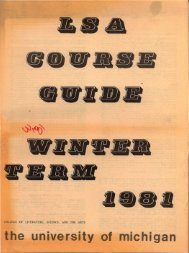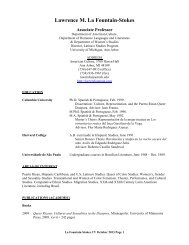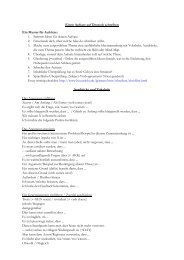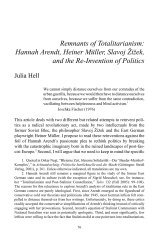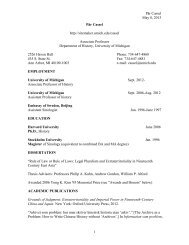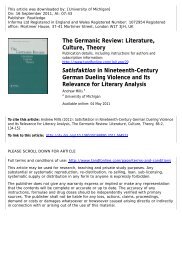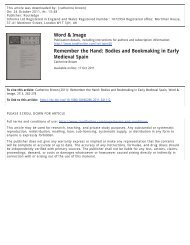Making History Personal: Constantine Cavafy and the Rise of Rome
Making History Personal: Constantine Cavafy and the Rise of Rome
Making History Personal: Constantine Cavafy and the Rise of Rome
Create successful ePaper yourself
Turn your PDF publications into a flip-book with our unique Google optimized e-Paper software.
Frier, “<strong>Making</strong> <strong>History</strong> <strong>Personal</strong>,” page 18<br />
Party, initially suppressed by fusillades but in <strong>the</strong> end partially successful. This tangled history<br />
<strong>of</strong> rising nationalism, which directly endangered <strong>the</strong> Greek diaspora on many fronts including<br />
Alex<strong>and</strong>ria, is conspicuously absent from <strong>Cavafy</strong>’s poetry, with <strong>the</strong> solitary exception <strong>of</strong> <strong>the</strong> un-<br />
published “27 June 1906, 2 P.M.” (1908) on <strong>the</strong> British execution <strong>of</strong> a young Egyptian whom<br />
<strong>Cavafy</strong> regarded as innocent—a poem that remains altoge<strong>the</strong>r an outlier. 54 While <strong>Cavafy</strong> was<br />
not, could scarcely have been, indifferent to <strong>the</strong> larger pattern <strong>and</strong> implications <strong>of</strong> <strong>the</strong>se events,<br />
<strong>the</strong>y go missing in his poetry, which h<strong>and</strong>les <strong>the</strong>m, at best, extremely obliquely. 55<br />
What emerges, however, from <strong>the</strong> poems on <strong>the</strong> Roman Republic’s conquests is a more<br />
general concern with <strong>the</strong> effects <strong>of</strong> imperialism on <strong>the</strong> Greek inhabitants <strong>of</strong> <strong>the</strong> Levant, <strong>and</strong>, in<br />
particular, at least an implied exploration <strong>of</strong> <strong>the</strong> effects <strong>of</strong> British presence in Egypt <strong>and</strong> in <strong>the</strong><br />
Middle East more broadly. There is little sign that <strong>Cavafy</strong> harbored strong anti-British senti-<br />
ments, or even that he resented British rule; <strong>and</strong> certainly we cannot be required to read an anti-<br />
British allegory into his historical poetry, or to infer that he was urging some specific course <strong>of</strong><br />
56<br />
action upon <strong>the</strong> Greek diaspora. Correspondingly, <strong>Cavafy</strong>’s treatment <strong>of</strong> <strong>the</strong> late Hellenistic<br />
world should not be read as anti-Roman per se; he is not critiquing Roman imperialism, but ac-<br />
cepting it as a fact, but <strong>the</strong>n going on to think, almost exclusively, about its implications for <strong>the</strong><br />
residents <strong>of</strong> <strong>the</strong> Hellenistic East. The views that <strong>Cavafy</strong> actually does express in his poems are<br />
<strong>the</strong>refore not conventionally political, though political none<strong>the</strong>less: an oblique poetics <strong>of</strong> impe-<br />
rialism, although always from a post-colonial perspective. 57<br />
54 On <strong>the</strong> tumultuous history <strong>of</strong> this era, see <strong>the</strong> chapters by Donald Malcolm Reid <strong>and</strong> M. W. Daly in Daly,<br />
ed., Modern Egypt (1999) 217-251; on <strong>the</strong> politically charged “Dinshawai incident” in 1906 which led to <strong>the</strong> hangings<br />
<strong>of</strong> four Egyptian villagers, p. 243 (an “icon <strong>of</strong> Egyptian nationalist mythology <strong>and</strong> British imperialism”). On<br />
<strong>Cavafy</strong> in Constantinople, see Liddell, <strong>Cavafy</strong> (1974) 32-48; on his 1921 retirement from <strong>the</strong> British bureaucracy in<br />
reliance on compensation promised by <strong>the</strong> Zaghloul government, 179.<br />
55 In conversation with Yannis Sareyannis, <strong>Cavafy</strong> was adamant that he “did not want his poems to appear<br />
linked with definite actuality,” <strong>and</strong> he rejected <strong>the</strong> view that “Those Who Fought on Behalf <strong>of</strong> <strong>the</strong> Achaean League”<br />
(1922) had been directly “inspired by <strong>the</strong> Asia Minor disaster”: Liddell, <strong>Cavafy</strong> (1974) 193, quoting Sareyannis.<br />
See, none<strong>the</strong>less, Haag, Alex<strong>and</strong>ria (2004) 109-113 on this poem.<br />
56 Liddell, <strong>Cavafy</strong> (1974) 78-94. <strong>Cavafy</strong>’s political stance remains disputed. Modern views are summarized<br />
by Jeffreys, Eastern Questions (2005) 69 n.77 (p. 175): “The debate was defined by Tsirkas <strong>and</strong> Malanos. Tsirkis<br />
went to great lengths to show how anti-British <strong>Cavafy</strong> was, a fact which Malanos disputed. Liddell begrudgingly<br />
takes a middle path …” Reference is to Tsirkas, Καβάφης 2 (1971), Malanos, Καβάφης (1957), <strong>and</strong> Liddell, <strong>Cavafy</strong><br />
(1974) 78-94, 130; see also Risva, Pensée Politique (1981).<br />
57 Keeley, Alex<strong>and</strong>ria (1976) 95: “his sympathies are consistently with <strong>the</strong> underdogs, <strong>the</strong> victims <strong>of</strong> history ra<strong>the</strong>r<br />
than its manipulators.” But this attitude is made problematic by his simultaneous indifference to Egyptian natives.<br />
For a fascinating examination <strong>of</strong> cosmopolitanism in colonial <strong>and</strong> post-colonial Egypt, see Starr, Cosmopolitan<br />
Egypt (2009).





